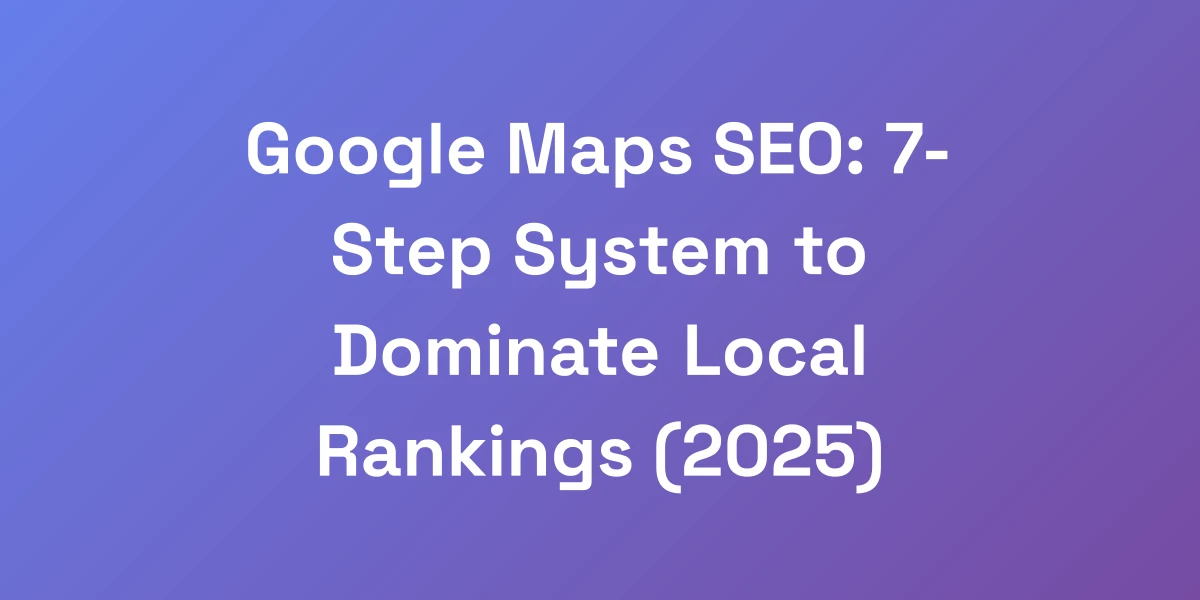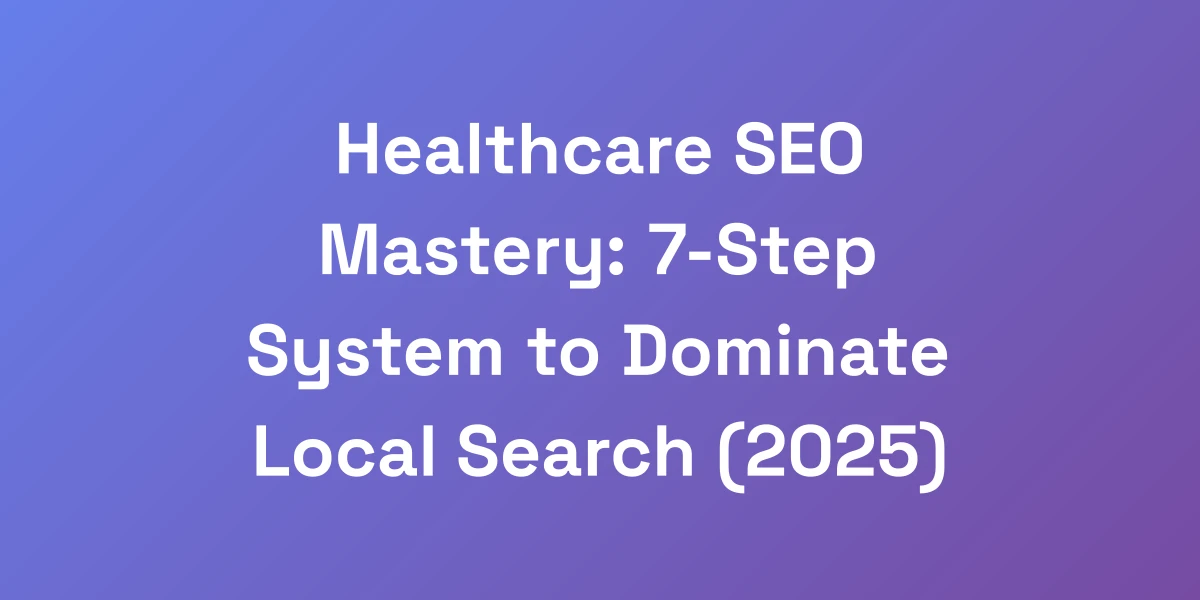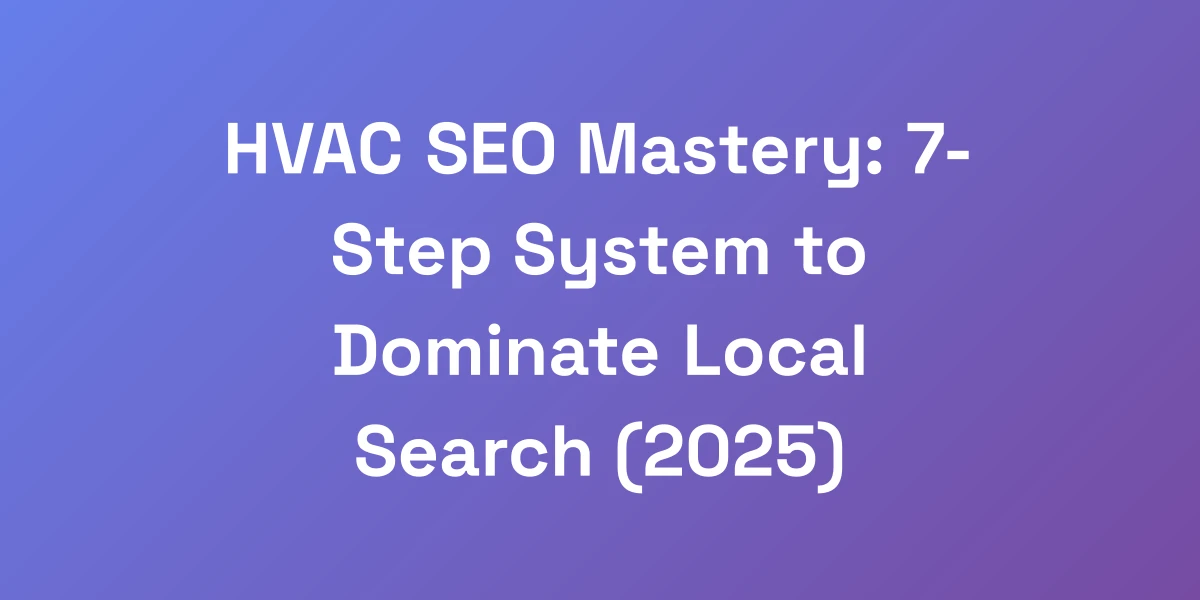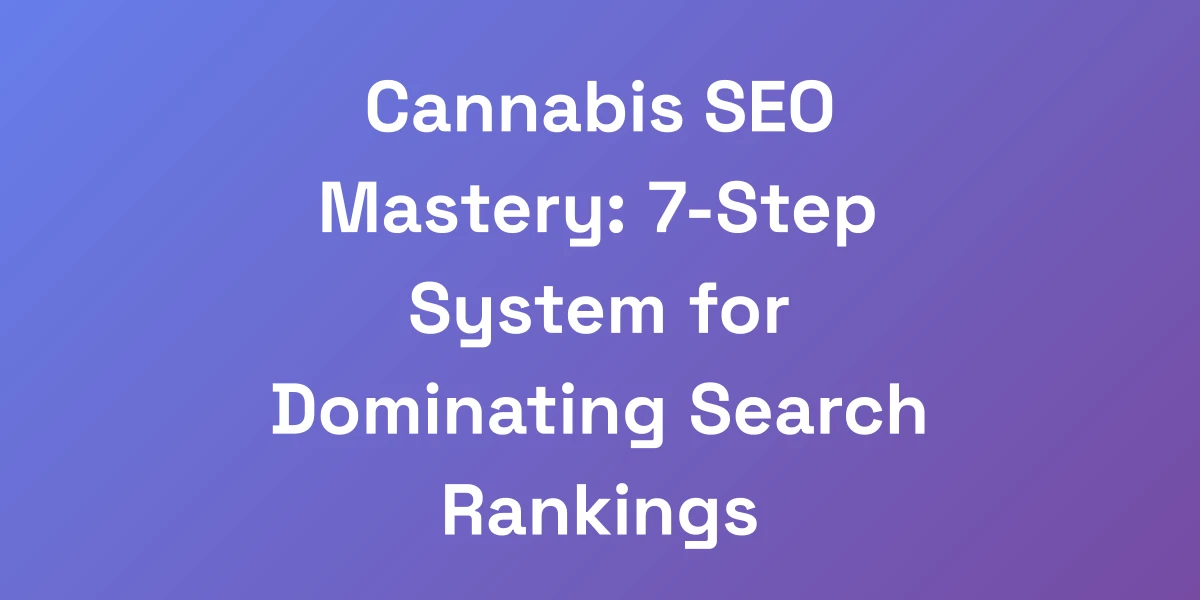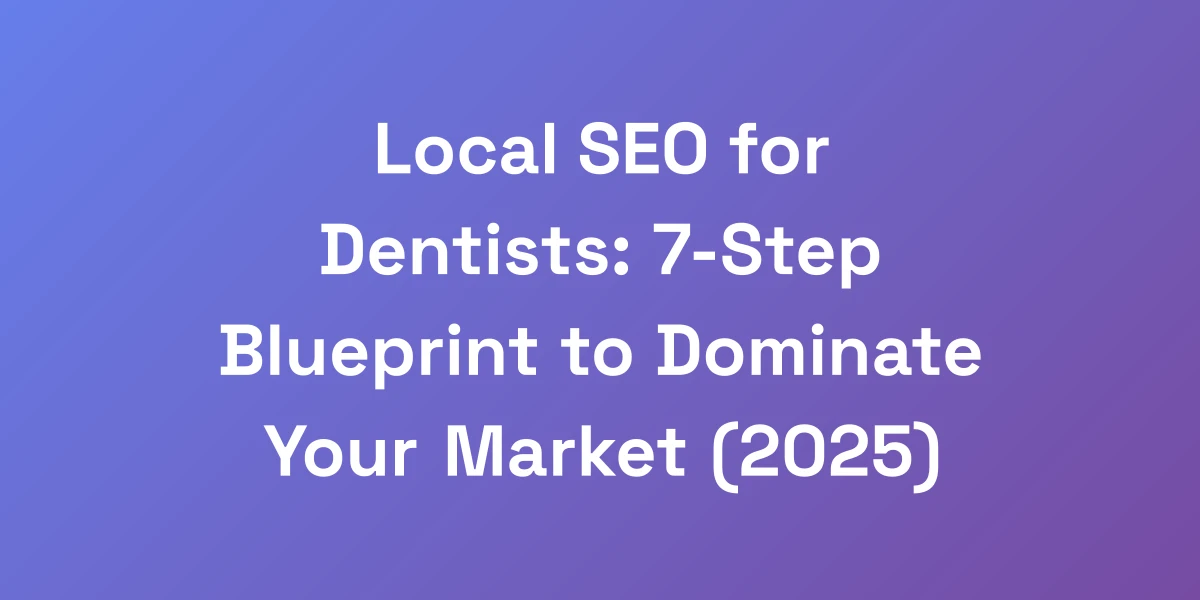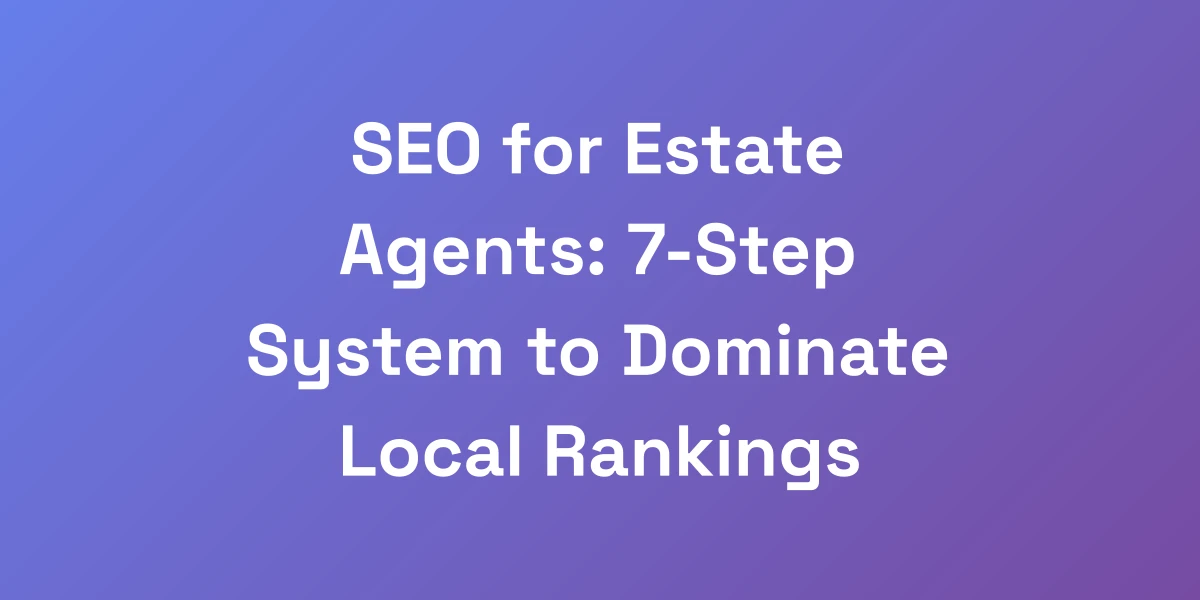
SEO for Estate Agents: 7-Step System to Dominate Local Rankings
Mar 14, 2025 | By [email protected]
Picture this: You’re a top-notch estate agent, ready to close deals and help clients find their dream homes. Yet, despite your best efforts, your online presence is barely a whisper in your local market.
It’s frustrating, right? Your potential clients are out there, actively searching for properties in your area, but if you’re not optimized for search engines, you’re essentially invisible to them.
But what if you could turn the tables and dominate your local rankings effortlessly?
We’re about to reveal a proven, 7-step SEO system tailored specifically for estate agents to boost your online visibility, attract qualified leads, and skyrocket your business growth.
Ready to transform your digital presence and leave your competitors in the dust? Let’s dive in.
Why Most Estate Agents Fail at SEO (And How to Be Different)
95% of estate agents are bleeding money by ignoring SEO for real estate. Here’s the truth – your potential clients aren’t browsing the Yellow Pages anymore. They’re typing “houses for sale in [your city]” into Google.
If you’re not showing up, you’re literally invisible to thousands of potential buyers and sellers. But here’s the good news: while your competitors are wasting money on outdated marketing, we’re going to show you how to systematically dominate your local property market through SEO. No fluff, just proven strategies that work in 2025.
The Real Cost of Ignoring SEO in Real Estate
Ignoring SEO means missing out on nearly 90% of home buyers who search online for properties. Without a strong online presence, you’re handing over your market share to agents who invest in SEO.
Think about it: while others are optimizing their websites, creating valuable content, and engaging with clients online, you’re stuck relying on traditional methods that just don’t cut it anymore.
Understanding the Modern Property Buyer’s Journey
Modern buyers embark on a digital-first journey. They start with online research, explore property websites, read reviews, and engage with local content before ever contacting an agent.
Understanding this journey is crucial. It allows us to tailor our SEO strategies to guide potential clients seamlessly from their first search to the final handshake.
The Local SEO Advantage for Estate Agents
Local SEO is your ticket to standing out in your specific geographic area. It ensures that when someone searches for a property in your city, your listings appear at the top of the results.
This targeted approach not only increases visibility but also attracts highly qualified leads who are ready to make a move.
Setting Realistic SEO Goals and Expectations
SEO isn’t an overnight success story. It requires patience, consistency, and realistic goal-setting. We’ll help you establish attainable objectives that align with your business growth, ensuring you stay motivated and on track.
Local Search Foundation: Setting Up Your Digital Real Estate Empire
Before you can dominate your local market, you need to build an unshakeable foundation. This isn’t about fancy tricks – it’s about establishing digital authority in your area.
First, we’ll optimize your Google Business Profile (which 73% of agents set up incorrectly), then create a location-specific content strategy that actually works. The key is to think like a local property buyer while setting up your digital assets.
Your competition is focusing on vanity metrics while we’re building a lead-generating machine.
Optimizing Your Google Business Profile for Maximum Visibility
Your Google Business Profile is often the first impression potential clients have of your business. An optimized profile means higher visibility in local searches and Google Maps.
- Accurate Categories: Choose the right primary and secondary categories to ensure you appear in relevant searches.
- High-Quality Images: Showcase your listings and office with professional photos to attract attention.
- Customer Reviews: Actively seek and manage reviews to build trust and improve ranking.
- Regular Updates: Keep your profile current with the latest information and promotions.
By mastering these elements, you lay the groundwork for unbeatable local SEO performance.
Creating Location-Specific Landing Pages That Convert
Generic landing pages won’t cut it. You need location-specific pages that speak directly to your target audience in each area you serve.
- Tailored Content: Highlight unique features and benefits of each neighborhood.
- Local Keywords: Incorporate location-based keywords naturally to enhance SEO.
- Clear CTAs: Direct visitors to take action, whether it’s contacting you or viewing a listing.
These tailored pages not only improve your SEO but also increase user engagement and conversions.
Building a Mobile-First Website Architecture
With nearly all searches happening on mobile devices, a mobile-first website is non-negotiable. Your site must be fast, responsive, and user-friendly.
- Responsive Design: Ensure your website looks and functions perfectly on all devices.
- Fast Loading Times: Optimize images and code to reduce load times, improving user experience.
- Easy Navigation: Simplify your site’s structure to make it easy for users to find what they’re looking for.
A mobile-friendly site not only pleases your visitors but also ranks better in search engines.
Local Citation Building and Management
Local citations are mentions of your business on other websites. They play a significant role in local SEO by validating your business’s legitimacy and location.
- Consistent NAP: Ensure your Name, Address, and Phone number are consistent across all platforms.
- Quality Listings: Focus on reputable directories and local sites relevant to your business.
- Regular Audits: Periodically check and update your citations to maintain accuracy.
Effective citation management boosts your local search rankings and drives more traffic to your site.
Setting Up Local Schema Markup
Schema markup is a form of structured data that helps search engines understand your website’s content better. For estate agents, it’s crucial for displaying property listings and business information effectively.
- Property Schema: Mark up your listings with details like price, location, and features.
- LocalBusiness Schema: Provide comprehensive information about your business to enhance search visibility.
- Event Schema: Highlight open houses and special events to attract more attendees.
Implementing schema markup ensures your listings stand out in search results, driving higher click-through rates.
Property-Focused Keyword Research That Actually Drives Leads
Forget generic keyword research – we’re going after high-intent property searches that actually convert.
I’ll show you how to identify keywords that signal genuine buying or selling interest in your area. The secret isn’t just finding high-volume keywords; it’s about understanding the search intent behind each query.
We’ll build a keyword ecosystem that captures potential clients at every stage of their property journey. Incorporating automated SEO tools can further enhance your keyword research and optimization efforts, ensuring you target the most effective terms for your market.
Finding High-Intent Local Property Keywords
High-intent keywords are those that indicate a strong likelihood of taking action, such as buying or selling a home. Focusing on these terms ensures you attract serious prospects.
- Examples: “buy house in [city]”, “sell my property in [city]”, “best real estate agents in [city]”
- Tools: Utilize keyword research tools like SEMrush or Ahrefs to uncover high-intent terms.
- Analysis: Evaluate the competition and search volume to prioritize the most effective keywords.
Targeting these keywords positions you as a go-to agent for serious buyers and sellers in your area.
Mapping Keywords to Buyer Journey Stages
Understanding where your prospects are in their journey allows you to tailor your content accordingly.
- Awareness Stage: “What to look for in a home”
- Consideration Stage: “Best neighborhoods in [city]”
- Decision Stage: “Contact real estate agent in [city]”
By aligning your keywords with these stages, you guide your audience smoothly from discovery to conversion.
Competitor Keyword Gap Analysis
Identify the keywords your competitors are ranking for that you’re not. This uncovers opportunities to fill those gaps and capture their traffic.
- Steps: Analyze competitor websites, use gap analysis tools, and find underserved keywords.
- Implementation: Create targeted content to rank for these missed opportunities.
Closing the keyword gap ensures you don’t leave potential business on the table.
Long-Tail Property Keywords That Convert
Long-tail keywords are specific phrases that capture niche interests, making them highly effective for conversion.
- Examples: “3-bedroom houses near [school name]”, “affordable condos in [neighborhood]”
- Benefits: Lower competition, higher relevance, and higher conversion rates.
Incorporating these terms attracts qualified leads who are ready to act.
Seasonal Keyword Opportunities in Real Estate
Real estate has its seasons. Leverage seasonal trends to optimize your SEO strategy and stay ahead of the competition.
- Examples: “summer homes for sale”, “winter real estate market trends”
- Strategy: Create timely content that aligns with seasonal search behavior.
This proactive approach keeps your content relevant and drives consistent traffic year-round.
Content Strategy: Creating Property Content That Ranks and Converts
Content without strategy is just noise. Your property content needs to serve two masters: Google’s algorithms and human psychology.
We’ll create a systematic content plan that addresses both. To support your systematic content plan, implementing business blogging can be a powerful strategy for driving sustained growth. The key is to build content clusters around your core property services while maintaining E-E-A-T signals that Google loves.
This isn’t about writing generic property descriptions – it’s about creating authoritative content that positions you as the local property expert.
Property Listing Optimization Framework
Optimizing your property listings ensures they stand out in search results and attract potential buyers.
- Detailed Descriptions: Provide comprehensive information about each property, including unique features and benefits.
- High-Quality Media: Use professional images and videos to showcase listings effectively.
- SEO Elements: Incorporate relevant keywords naturally within titles, descriptions, and metadata.
Optimized listings not only rank better but also engage visitors, increasing the chances of conversion.
Creating Location-Specific Content Clusters
Content clusters revolve around a central theme, enhancing your site’s authority on specific topics.
- Main Topic: Create a pillar page focused on a key subject, such as “Living in [City]”
- Supporting Content: Develop related articles like “Top Schools in [City]”, “Best Neighborhoods for Families”, and “Real Estate Market Trends in [City]”
- Internal Linking: Connect all related content to the pillar page to boost SEO and user navigation.
This strategy reinforces your expertise and improves search engine rankings across multiple related keywords.
Developing Authority Through Market Reports
Publishing detailed market reports positions you as an industry authority and builds trust with your audience.
- Data-Driven Insights: Use local data to provide valuable insights into market trends and forecasts.
- Regular Updates: Keep your reports current to maintain relevancy and authority.
- Visual Elements: Incorporate charts, graphs, and infographics to enhance readability and engagement.
Authority-driven content attracts both search engines and potential clients, boosting your online presence.
Video SEO for Property Walkthroughs
Video content is a powerful tool for engaging potential clients and improving SEO.
- Professional Quality: Invest in high-quality videos that showcase properties effectively.
- SEO Optimization: Use descriptive titles, tags, and transcripts to make your videos searchable.
- Distribution: Share your videos across multiple platforms, including your website, YouTube, and social media.
Optimized videos not only enhance user experience but also rank well in search results, driving more traffic to your site.
User-Generated Content Strategies
Encouraging clients to generate content can amplify your SEO efforts and build community trust.
- Testimonials: Showcase client success stories and reviews to build credibility.
- Social Media Sharing: Encourage clients to share their experiences on social platforms, linking back to your website.
- Interactive Features: Create forums or Q&A sections where clients can engage and contribute content.
User-generated content not only enriches your site’s content but also fosters a sense of community and trust.
Technical SEO Essentials for Property Websites
Technical SEO might sound boring, but it’s the engine that powers your digital presence. Without it, even the best content won’t rank.
We’ll show you how to audit and optimize your website’s technical foundation without getting lost in developer jargon. Consider using automatic SEO optimization tools to streamline this process and increase efficiency.
We’ll focus on the specific technical elements that matter most for property websites, ensuring your site is built for both speed and conversions.
Site Speed Optimization for Property Images
Slow-loading images can frustrate users and hurt your rankings. Optimizing image speed is crucial for maintaining a fast, user-friendly site.
- Compression: Reduce image file sizes without sacrificing quality using tools like TinyPNG.
- Formats: Utilize modern formats like WebP for faster loading times.
- Lazy Loading: Implement lazy loading to defer off-screen images, speeding up initial page load.
Fast-loading images enhance user experience and keep potential clients engaged on your site longer.
Mobile Usability for Property Searches
With the majority of property searches happening on mobile devices, ensuring your site is mobile-friendly is non-negotiable.
- Responsive Design: Ensure your site adapts seamlessly to all screen sizes and devices.
- Touch-Friendly Navigation: Make buttons and links easy to navigate on smaller screens.
- Mobile Testing: Regularly test your site on various mobile devices to ensure optimal performance.
A mobile-optimized site not only ranks better but also provides a superior user experience, increasing the likelihood of conversions.
XML Sitemaps and Property Indexing
XML sitemaps help search engines understand the structure of your website, ensuring all important pages are indexed.
- Comprehensive Sitemaps: Include all key pages, especially property listings and location-specific pages.
- Regular Updates: Keep your sitemap current with any new listings or site changes.
- Submission: Submit your sitemap to Google Search Console to facilitate indexing.
Proper indexing ensures your valuable content is discoverable by search engines and potential clients.
Internal Linking Strategy for Property Listings
Internal linking helps distribute link equity throughout your site and guides users to relevant content.
- Strategic Links: Link related property listings, blog posts, and service pages to enhance navigation.
- Anchor Text: Use descriptive anchor text that includes relevant keywords.
- Hierarchy: Maintain a clear site hierarchy to ensure important pages receive sufficient internal links.
A well-structured internal linking strategy enhances both SEO and user experience, keeping visitors engaged longer.
Structured Data for Property Listings
Structured data helps search engines understand the specifics of your property listings, improving their visibility in search results.
- Property Schema: Include details like price, location, size, and amenities.
- Rich Snippets: Enable rich snippets to display enhanced information in search results.
- Validation: Use tools like Google’s Structured Data Testing Tool to ensure accuracy.
Properly implemented structured data boosts your listings’ attractiveness in search results, leading to higher click-through rates.
Link Building Strategies for Estate Agents
Links are still the currency of SEO, but not all links are created equal. We’ll show you how to build high-authority local links that actually move the needle. To further optimize your SEO efforts, consider affordable SEO services that can assist you in scaling your strategies without breaking the bank.
We’ll focus on relationship-based link building that establishes your agency as a trusted local authority. Forget generic directories – we’re going after strategic partnerships that drive both rankings and referrals. For more complex SEO needs, partnering with the best SEO outsourcing companies can provide additional expertise and support.
Local Press and Media Relationships
Building relationships with local media can earn you valuable backlinks and media coverage.
- Press Releases: Share newsworthy updates about your business or local market trends.
- Guest Articles: Contribute expert articles to local newspapers or online publications.
- Local Stories: Offer insights or commentary on local real estate developments to journalists.
These relationships not only provide quality backlinks but also enhance your reputation as a local expert.
Community Event Sponsorships
Sponsoring local events is a powerful way to gain backlinks and increase brand visibility.
- Events: Sponsor community fairs, sports events, or charity runs.
- Local Partnerships: Collaborate with other local businesses to co-sponsor events.
- Online Mentions: Ensure the event website links back to your site as a sponsor.
Sponsorships provide a platform to showcase your business and earn authoritative local backlinks.
Industry Partnership Link Building
Partnering with other businesses in the real estate industry can lead to valuable backlinks.
- Collaborations: Work with mortgage brokers, home inspectors, or interior designers on co-branded content.
- Referrals: Establish referral partnerships that benefit both parties and include link exchanges.
- Joint Ventures: Launch joint webinars or workshops that feature backlinks to each partner’s site.
These partnerships strengthen your network and provide high-quality backlinks that boost your SEO.
Content-Driven Link Acquisition
Creating exceptional content naturally attracts backlinks from other websites.
- Valuable Resources: Develop comprehensive guides, market reports, or interactive tools.
- Shareable Content: Create infographics, videos, or case studies that others want to share.
- Outreach: Proactively reach out to websites and blogs to feature your content.
High-quality, shareable content is a magnet for backlinks, enhancing your site’s authority and ranking.
Competitor Link Analysis and Replication
Analyzing your competitors’ backlink profiles can uncover new opportunities for your own SEO strategy.
- Tools: Use tools like Ahrefs or SEMrush to identify where your competitors are getting their links.
- Replication: Target the same high-quality sites to secure similar backlinks.
- Innovation: Find unique opportunities that your competitors might have missed.
By replicating and enhancing your competitors’ link strategies, you can strengthen your own backlink profile effectively.
Measuring and Scaling Your Property SEO Success
What gets measured gets managed. We’ll show you exactly which metrics matter for property SEO and how to track them effectively.
We’ll set up a data-driven system to monitor your progress and identify new opportunities. The goal isn’t just to rank – it’s to create a predictable flow of qualified property leads through organic search.
Setting Up Google Analytics 4 for Property Websites
Google Analytics 4 is essential for tracking your website’s performance and understanding user behavior.
- Implementation: Set up GA4 correctly to capture all relevant data.
- Goals and Events: Define specific goals like contact form submissions and property inquiries.
- Custom Dashboards: Create dashboards tailored to your SEO metrics for easy monitoring.
Proper setup allows you to gain valuable insights into your website’s performance and adjust your strategies accordingly.
Key Performance Indicators for Property SEO
Identifying the right KPIs ensures you’re tracking the metrics that truly impact your business.
- Organic Traffic: Monitor the number of visitors coming from search engines.
- Conversion Rate: Measure how well your site converts visitors into leads.
- Keyword Rankings: Track the rankings of your target keywords over time.
- Bounce Rate: Analyze how many visitors leave your site without engaging.
Focusing on these KPIs helps you evaluate the effectiveness of your SEO efforts and make informed decisions.
ROI Tracking and Reporting
Understanding the return on investment (ROI) of your SEO efforts is crucial for justifying your strategies and budget.
- Cost Analysis: Calculate the costs associated with your SEO activities.
- Lead Value: Assign a monetary value to your leads to estimate potential revenue.
- Reporting: Create regular reports to track ROI and present findings to stakeholders.
Tracking ROI ensures that your SEO investments are driving tangible business growth.
Scaling Successful SEO Strategies
Once you identify what works, scaling those strategies amplifies your success.
- Replication: Apply successful tactics to other areas or services within your business.
- Automation: Use SEO tools to automate repetitive tasks, freeing up time for strategic initiatives.
- Expansion: Explore new keywords, content topics, and link-building opportunities to further enhance your SEO.
Scaling your successful strategies ensures sustained growth and continuous improvement in your SEO performance.
Adapting to Market Changes and Algorithm Updates
SEO is constantly evolving with market trends and search engine algorithm updates. Staying adaptable is key to maintaining your rankings.
- Continuous Learning: Stay updated with the latest SEO best practices and industry news.
- Flexible Strategies: Be prepared to pivot your strategies in response to changes.
- Regular Audits: Conduct periodic SEO audits to identify and address any issues promptly.
Adaptability ensures that your SEO strategy remains effective and competitive in a dynamic digital landscape.
Conclusion
SEO for estate agents isn’t just a nice-to-have; it’s a critical component of your business strategy that can drive significant growth and success.
By implementing our 7-step system, you’ll establish a strong local presence, attract qualified leads, and outshine your competition in the online space.
Remember, SEO is a marathon, not a sprint. Stay committed, keep refining your strategies, and watch your rankings—and your business—soar.
Ready to dominate your local market with SEO? Start implementing these steps today and transform your estate agency into a local powerhouse.
Have questions or want to share your success stories? We’d love to hear from you! Drop a comment below or reach out to us directly. Let’s grow together.
